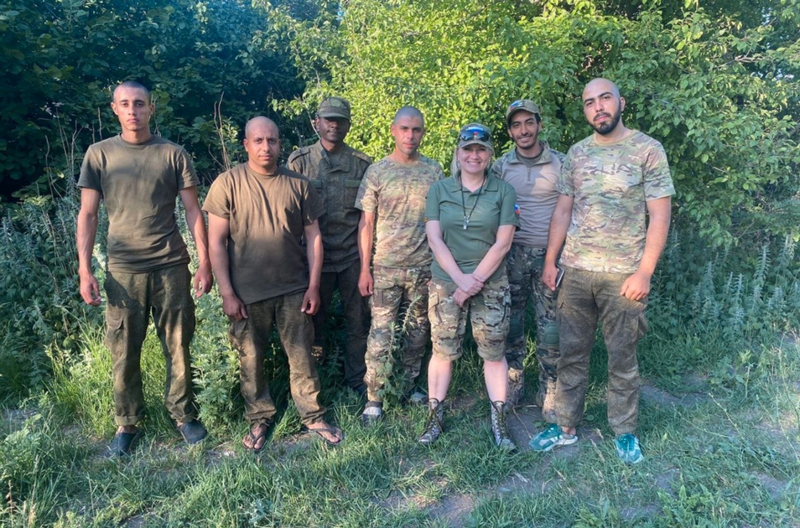The Insider previously detailed how Russia’s Federal Security Service (FSB), using shell companies, has been directing the flow of refugees from Arab countries into Europe with the aim of creating a migration crisis. Now it appears that the same system is being repurposed to recruit migrants from the Middle East and North Africa for frontline combat in Ukraine. In return for participating in the war, refugees are being offered Russian citizenship and a $2,200 monthly salary.
For more than 20 years, the “Made in Russia24” project has facilitated a steady influx of foreign citizens from Arab and African countries into Russia, Belarus, Kazakhstan before shuttling them along to the EU. Initially, those wanting to relocate were often issued student visas through enrolment at Perm Polytechnic University in Russia’s western Urals. Starting in 2019, Perm-based businessman Sergey Merzlyakov and his business partner, Iraqi-born Russian citizen Khalid Elameri, began actively promoting their services on social media platforms like YouTube and Instagram.
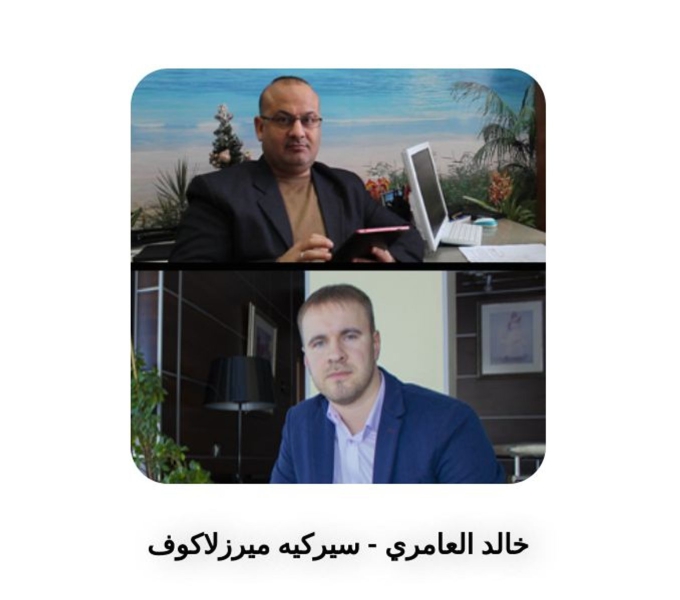
The project has previously been involved in FSB-led schemes to direct migrant flows into Poland and Finland, as revealed in The Insider’s investigation in December of last year. In the fall of 2021, when thousands of illegal immigrants crossed into Poland from Belarus, Merzlyakov provided them advice on how to quickly leave Belarus, while Khalid Elameri gave explanations on how best to behave at the Belarus-EU border.
Following the start of Russia's full-scale invasion of Ukraine, Merzlyakov and Elameri’s migrant smuggling business shifted to recruiting Arab nationals for the Russian Ministry of Defense (MoD) and affiliated private military companies.

On the surface, their businesses do not appear to present any malicious intent — they come across as Russian companies offering migrants opportunities to legalize their status, seek employment, or pursue education in Russia, Belarus, or Kazakhstan. Websites such as Hala Russia Travel and Sergey Habibi actively promote these options. In reality, however, the primary — and often the only — path presented to migrants is enlisting in the Russian army, an offer accompanied by promises of fast-tracked citizenship and additional benefits.
The primary — and often the only — path presented to migrants is enlisting in the Russian army, an offer accompanied by promises of fast-tracked citizenship and additional benefits.
Offers of recruitment for military operations are actively spread through social media networks and messaging apps. They are written exclusively in Arabic and aggressively promote the opportunity to quickly and easily acquire citizenship through contract service in the Russian military.
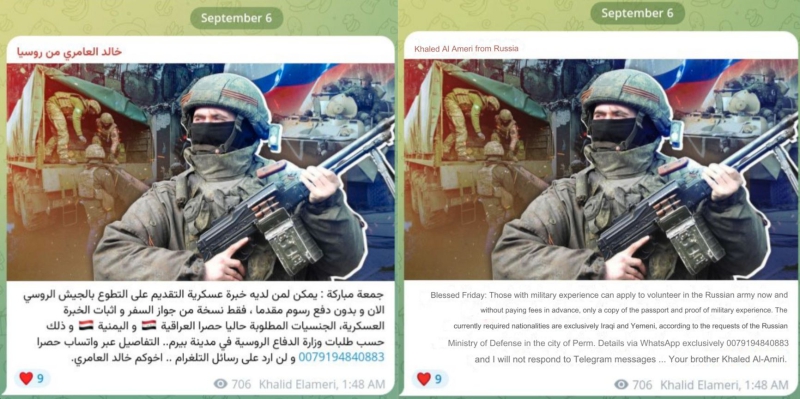
The scheme is simple. Applicants submit their passport details and pay $1,000 for a “special invitation” to enter Russia through Made in Russia24, Sergey Merzlyakov, or Khalid Elameri.
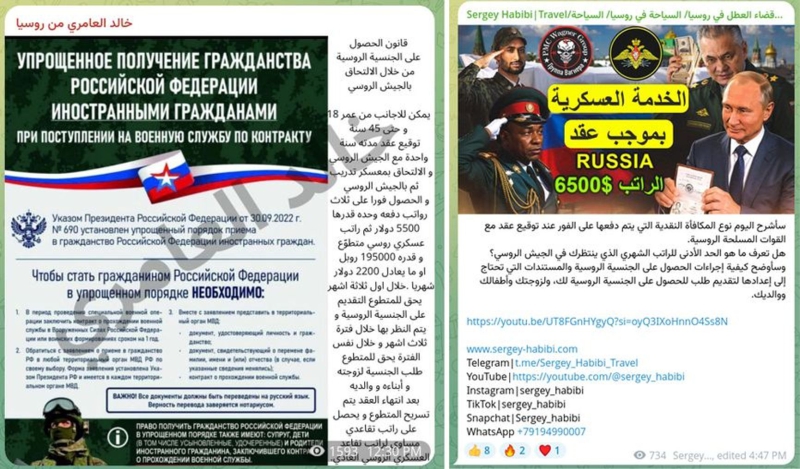
Upon landing at the airport, recruits are greeted by a representative of the Russian military and a translator before being transported to Perm. After completing registration, they spend a month in a camp undergoing intensive Russian language and military training. The promised salary for the first month is $9,400 (until July 2024 it was $7,700), followed by $2,200 per month thereafter. Made In Russia24 guarantees that recruits will obtain Russian passports within six months of signing a contract with the country’s Ministry of Defense.
Made In Russia24 guarantees that recruits will obtain Russian passports within six months of signing a contract with the country’s Ministry of Defense.
The mercenaries reportedly serve in the Russian MoD's “elite international battalion,” signing contracts for at least one year. Aside from their salary, a bonus system offers rewards ranging from 50,000 rubles ($540) to one million rubles (close to $10,700) for destroying or capturing enemy equipment. In the event of death, the soldier’s family receives a one-time payment of 15 million rubles (nearly $167,000) and a monthly pension of $530 for the heirs of the deceased. The soldier's body is also promised to be repatriated to their home country.
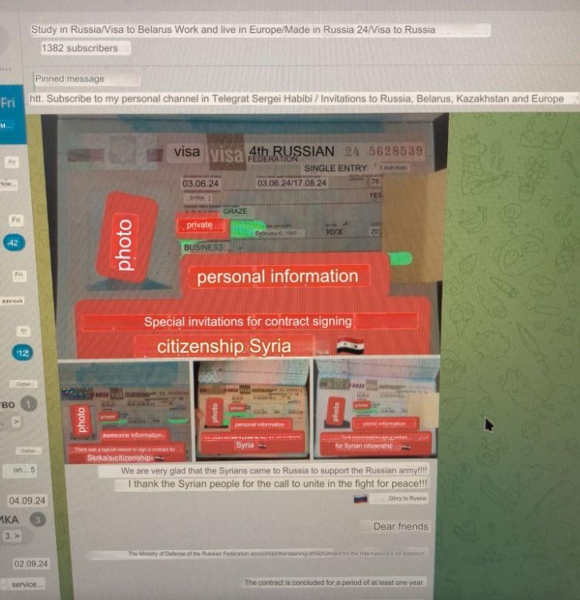
Photos posted in these groups show examples of genuine visas issued to Syrian and Egyptian citizens, suggesting the scheme is indeed operational. One accompanying text specifies that the visas are provided as “special invitations” for signing contracts with the Russian army.

The scheme targets citizens of developing countries with limited economic prospects.
One of the posts on the “Sergey Habibi Travel” Telegram channel reads: “We thank every soldier that has joined the Russian army!!! We thank soldiers from Cameroon, Nigeria, Morocco, Algeria, Tunisia, Iraq, Egypt, and Syria.”
Judging by the reports made by Sergey Merzlyakov, Khalid Elameri, and their affiliated companies, the business appears to be thriving, and it maintains close ties with Russian state and semi-state entities. One of the company’s posts mentions that the Russian Ministry of Defense has begun recruiting for an “international elite battalion.”
For Russia, Arab recruits offer multiple advantages — they provide an affordable source of manpower, helping to fill personnel shortages in military units amid heavy casualties. They can also be deployed to handle demanding frontline tasks, allowing more experienced Russian troops to focus on other tasks. However, Russia’s recruitment efforts for military service have not attracted nearly the same quantity of willing participants that were drawn to the scheme which ultimately “succeeded” in creating the manufactured crises along the Finnish and Polish borders.
As was laid out in a previous investigation by The Insider, the infrastructure for the migrant crisis scheme operated under the direct supervision of the FSB, and it is possible that Russian intelligence agencies are interested in recruiting some of these migrants for deployment in “unfriendly” countries, where they could be directed to engage in destabilization and espionage activities. A number of the recruited migrants could later attempt to enter the EU, following the same routes provided by Made In Russia24.
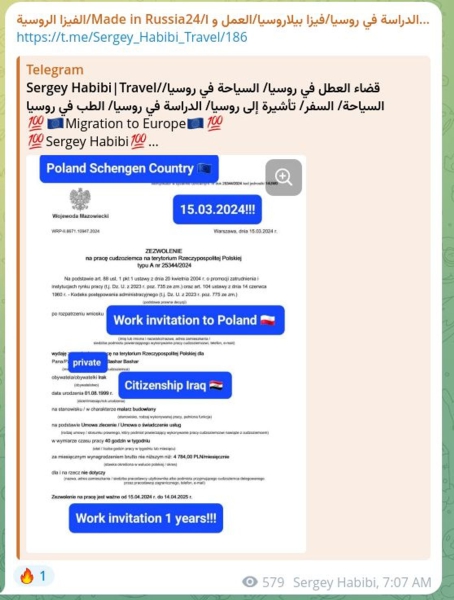
In any case, the company is already actively promoting the opportunity for Arab citizens to obtain Polish work visas — with an option to travel to France or Germany one week after they enter the Schengen area.

